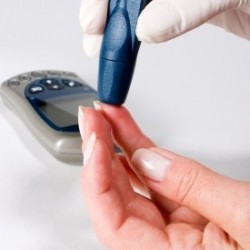
Could probiotics decrease endotoxin levels and other cardiometabolic parameters in patients with type 2 diabetes mellitus (T2DM)?
This study set out to assess whether multi-strain probiotic supplementation could reduce endotoxin levels and consequently improve cardiometabolic profiles in metabolically-high risk populations.
This 6-month, single-center, double-blind, randomized, placebo-controlled clinical trial included 150 adult Saudi Arab participants [73 females (46 (63%) menopause), 77 males, aged 30–60 years old] with newly diagnosed T2DM. Of the 150 participants that were recruited, 96 were randomized, 78 completed 3 months and 61 completed the entire trial (probiotics group, n = 31; placebo group, n = 30).

Patients with diabetes complications (retinopathy, neuropathy, nephropathy, etc.) and poor glycemic control (HbA1c > 7%) as noted in their medical records were excluded. Participants on prebiotics, probiotics, or antibiotics treatment 6 weeks before inclusion, lactating or pregnant women, on insulin or its analogs and those with gastrointestinal diseases were also excluded.
Circulating endotoxin level was measured as a primary outcome. Anthropometrics, glycemic parameters, lipid profile, inflammatory and adipocytokine markers were measured as secondary outcomes. Significant differences in the assessment between placebo and probiotics group after random allocation served as baseline covariate variables in this study.
The probiotics group was give sachets of freeze-dried probiotic powder (5.0 × 109 cfu/g)] which contained the following strains: Bifidobacterium bifidum W23, Bifidobacterium lactis W52, Lactobacillus acidophilus W37, Lactobacillus brevis W63, Lactobacillus casei W56, Lactobacillus salivarius W24, Lactococcus lactis W19 and L. lactis W58. Available in the United States as Omni-Biotic® Hetox.
“This probiotic combination has been previously investigated for its ability to improve endothelial barrier and its potency to inhibit mast cell activation, inhibit pro-inflammatory cytokines, and decrease endotoxin load,” the researchers cited.
Study Results
- Circulating endotoxin levels were significantly reduced (70%) post-intervention in the probiotics group, whilst the placebo group remained unchanged.
- There was a clinically significant difference in Homeostasis model assessment (HOMA-IR) with improvement in insulin sensitivity in the probiotic group.
- The probiotic group saw an improvement in adipocytokines with a reduction in TNFα, IL-6, CRP, resistin and a rise in adiponectin at six months.
- At six months, there were also improvements in cholesterol, total cholesterol/HDL ratio, and glycemic control from baseline in the probiotics group analysis.
The researchers said that while this is not the first interventional study on the effects of probiotics in patients with T2DM, this study protocol addressed previously noted trial concerns about study duration and use of multiple strains. As is seen here, the 6-month trial period was important to observe changes.
“Previous studies have tried to evaluate the beneficial effects of probiotics in T2DM with the ultimate cardiometabolic benefits requiring more than 3 months, with our study suggesting 6-month follow up may highlight promising findings,” the researchers wrote.
What accounts for the results? The researchers believe that the reduction in systemic endotoxin level in probiotic group may be because probiotics alter the gut microbiome and “act as competitive inhibition with other bacterial components via adherence to the mucosa and epithelium, strengthen the intestinal epithelial barrier function.” This translates to reduced circulating endotoxin, and modification of the immune response in favor of the host. They also noted that the use of eight strains likely provided a cumulative effect on changes to the gut and were strengthen by the longer duration of intervention.
The authors acknowledge limitations of the study. For instance, they did not see successful colonization of probiotics in the intestinal tract, though the absence of gut microbiome data does not necessarily mean absence of efficacy, they noted. “The study also had a low response rate, partly because majority of the patients who initially showed interest to participate declined to continue after a few days, probably because the concept of ingesting live bacteria to improve metabolic status is relatively unheard of in this part of the world,” they concluded.
“We were delighted that Omni-Biotic Hetox was identified as the treatment probiotic for this unique 6-month study in naïve T2DM patients. The findings including decreased endotoxin load, improved insulin sensitivity and glycemic control, in addition to a positive shift in cholesterol parameters, provide encouraging data-based evidence in support of the many positive outcomes reported by practitioners,” the Omni-Biotics Team noted.
Conclusion/ “A daily multi-strain probiotic supplementation for 6 months can significantly improve HOMA-IR, reduce endotoxin and inflammatory adipokine levels amongst Arab T2DM subjects. The significant improvement in insulin resistance in favor of the probiotics group despite the low sample size and the rigorous analysis performed merit clinical attention. Findings from the study offer important information that will expand our current understanding on how multi-strain probiotic supplements work in the diabetic population arising from a relatively homogenous and understudied ethnic population.”





